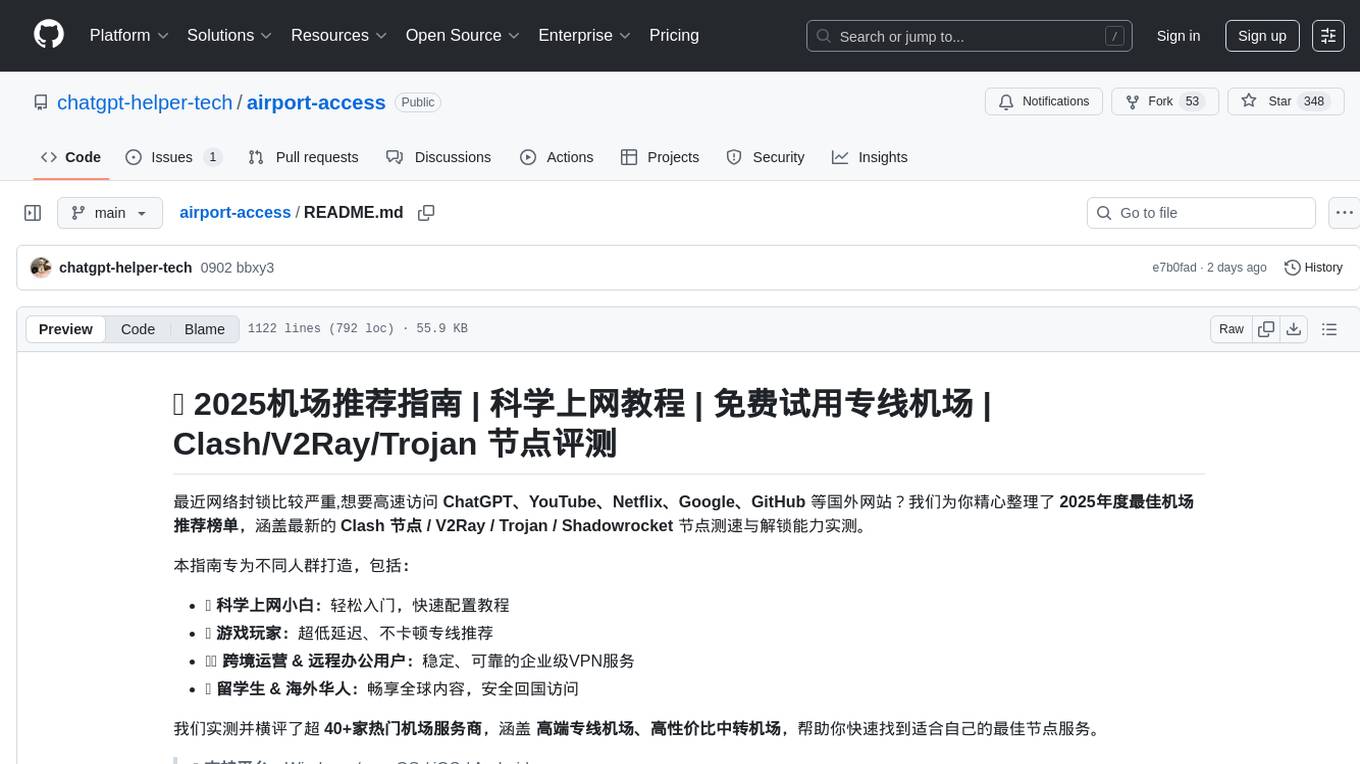
DeepLearing-Interview-Awesome-2024
AIGC-interview/CV-interview/LLMs-interview面试问题与答案集合仓,同时包含工作和科研过程中的新想法、新问题、新资源与新项目
Stars: 1587
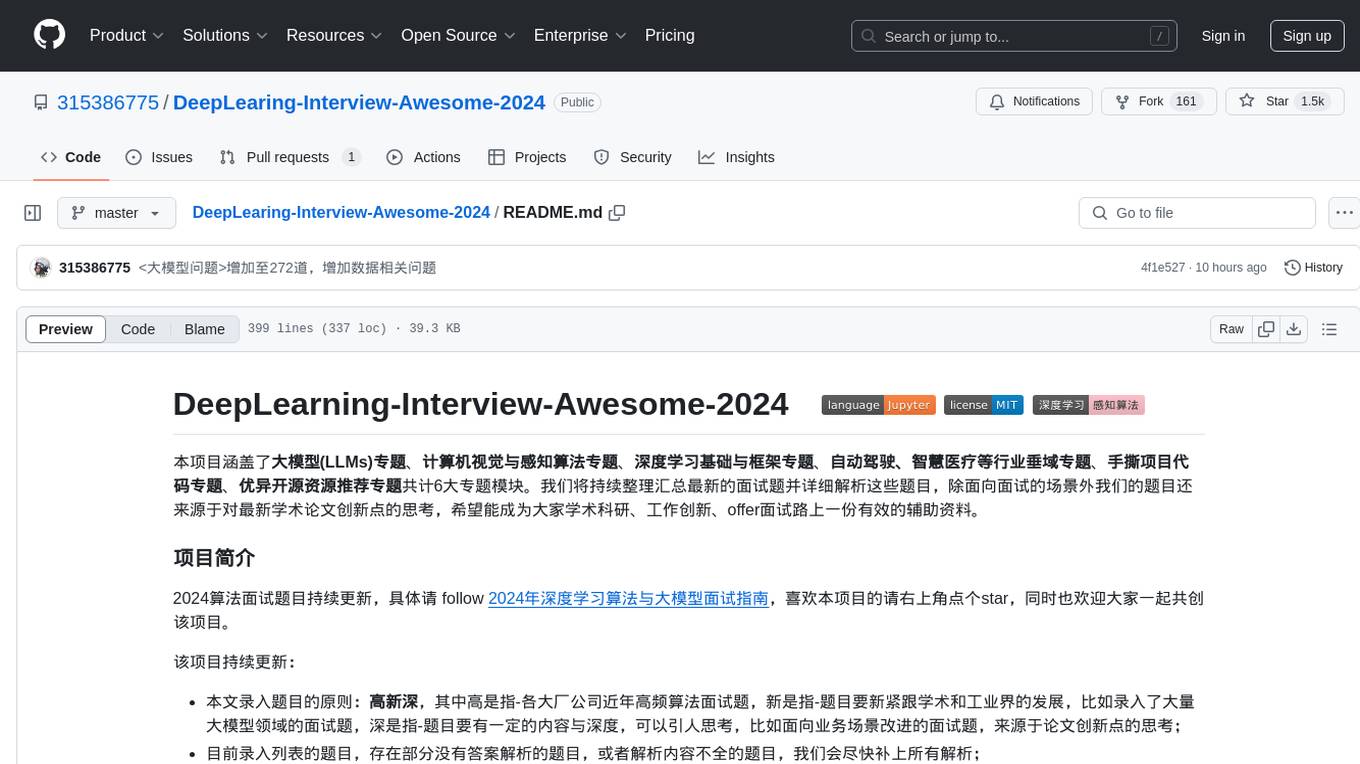
DeepLearning-Interview-Awesome-2024 is a repository that covers various topics related to deep learning, computer vision, big models (LLMs), autonomous driving, smart healthcare, and more. It provides a collection of interview questions with detailed explanations sourced from recent academic papers and industry developments. The repository is aimed at assisting individuals in academic research, work innovation, and job interviews. It includes six major modules covering topics such as large language models (LLMs), computer vision models, common problems in computer vision and perception algorithms, deep learning basics and frameworks, as well as specific tasks like 3D object detection, medical image segmentation, and more.
README:
本项目涵盖了大模型(LLMs)专题、计算机视觉与感知算法专题、深度学习基础与框架专题、自动驾驶、智慧医疗等行业垂域专题、手撕项目代码专题、优异开源资源推荐专题共计6大专题模块。我们将持续整理汇总最新的面试题并详细解析这些题目,除面向面试的场景外我们的题目还来源于对最新学术论文创新点的思考,希望能成为大家学术科研、工作创新、offer面试路上一份有效的辅助资料。
2024算法面试题目持续更新,具体请 follow 2024年深度学习算法与大模型面试指南,喜欢本项目的请右上角点个star,同时也欢迎大家一起共创该项目。
该项目持续更新:
- 本文录入题目的原则:高新深,其中高是指-各大厂公司近年高频算法面试题,新是指-题目要新紧跟学术和工业界的发展,比如录入了大量大模型领域的面试题,深是指-题目要有一定的内容与深度,可以引人思考,比如面向业务场景改进的面试题,来源于论文创新点的思考;
- 目前录入列表的题目,存在部分没有答案解析的题目,或者解析内容不全的题目,我们会尽快补上所有解析,关注码科智能公众号后台回复<666>进入交流群获取题目的深度解析(营销号勿扰,纯学术交流);
- 目前录入列表的顺序,没有先后、频次、难度、细类别等维度信息,后续会再给予更多维度更详细的分类;
- 欢迎关注微信公众号:码科智能,每日更新大模型相关开源项目/代码指南/实用教程等内容;
- 欢迎添加作者微信,交流探讨人工智能各个行业的前沿内容,分享常用AIGC工具等;
- 公众号已搭建大语言模型聊天助手,可帮你查询天气、定点推送新闻、文章总结、代码理解及其他常见聊天功能,欢迎体验。
- 大语言模型
- 视觉模型
- 通用问题
- 多模态模型/强化学习/AGI等
| 01. 举例说明强化学习如何发挥作用? |
|---|
| 28. 如何理解强化学习中的奖励最大化? |
| 24. 领域数据训练后,通用能力往往会有所下降,如何缓解模型遗忘通用能力? |
| 25. 在大型语言模型 (llms)中数据模态的对齐如何处理? |
| 35. 你能提供一些大型语言模型中对齐问题的示例吗? |
- 常见问题
- 目标分类
- 目标检测
- 目标分割
- 3D目标检测
- 对抗网络/视频理解/图像增强/深度估计等
| 01. 对抗网络:GAN中的模式坍缩的识别和解决? |
|---|
| 02. 深度估计:简述深度估计任务中常用到的光度重建损失? |
- Pytorch常用操作及问题
- 那些常用的训练框架
- 深度学习常见问题
- 自动驾驶
- 智慧医疗
- 自然语言处理/智慧商业/搜广推
| 01. 自然语言处理:NLP中给定当前query和历史query以及对应实体,如何对当前query的实体进行建模? |
|---|
| 02. 机器学习:银行经理收到一个数据集,其中包含数千名申请贷款的申请人的记录。AI算法如何帮助经理了解他可以批准哪些贷款? |
- 场景实战
For Tasks:
Click tags to check more tools for each tasksFor Jobs:
Alternative AI tools for DeepLearing-Interview-Awesome-2024
Similar Open Source Tools

DeepLearing-Interview-Awesome-2024
DeepLearning-Interview-Awesome-2024 is a repository that covers various topics related to deep learning, computer vision, big models (LLMs), autonomous driving, smart healthcare, and more. It provides a collection of interview questions with detailed explanations sourced from recent academic papers and industry developments. The repository is aimed at assisting individuals in academic research, work innovation, and job interviews. It includes six major modules covering topics such as large language models (LLMs), computer vision models, common problems in computer vision and perception algorithms, deep learning basics and frameworks, as well as specific tasks like 3D object detection, medical image segmentation, and more.
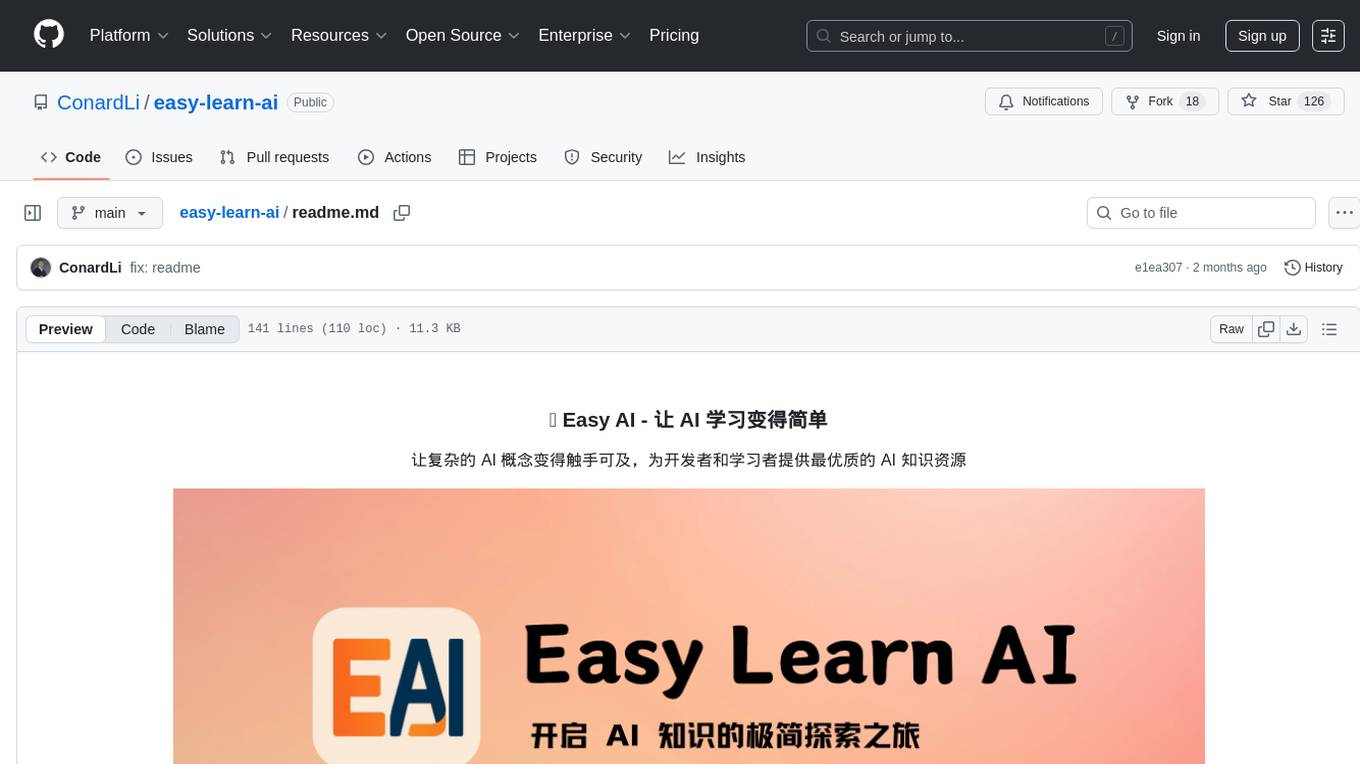
easy-learn-ai
Easy AI is a modern web application platform focused on AI education, aiming to help users understand complex artificial intelligence concepts through a concise and intuitive approach. The platform integrates multiple learning modules, providing a comprehensive AI knowledge system from basic concepts to practical applications.
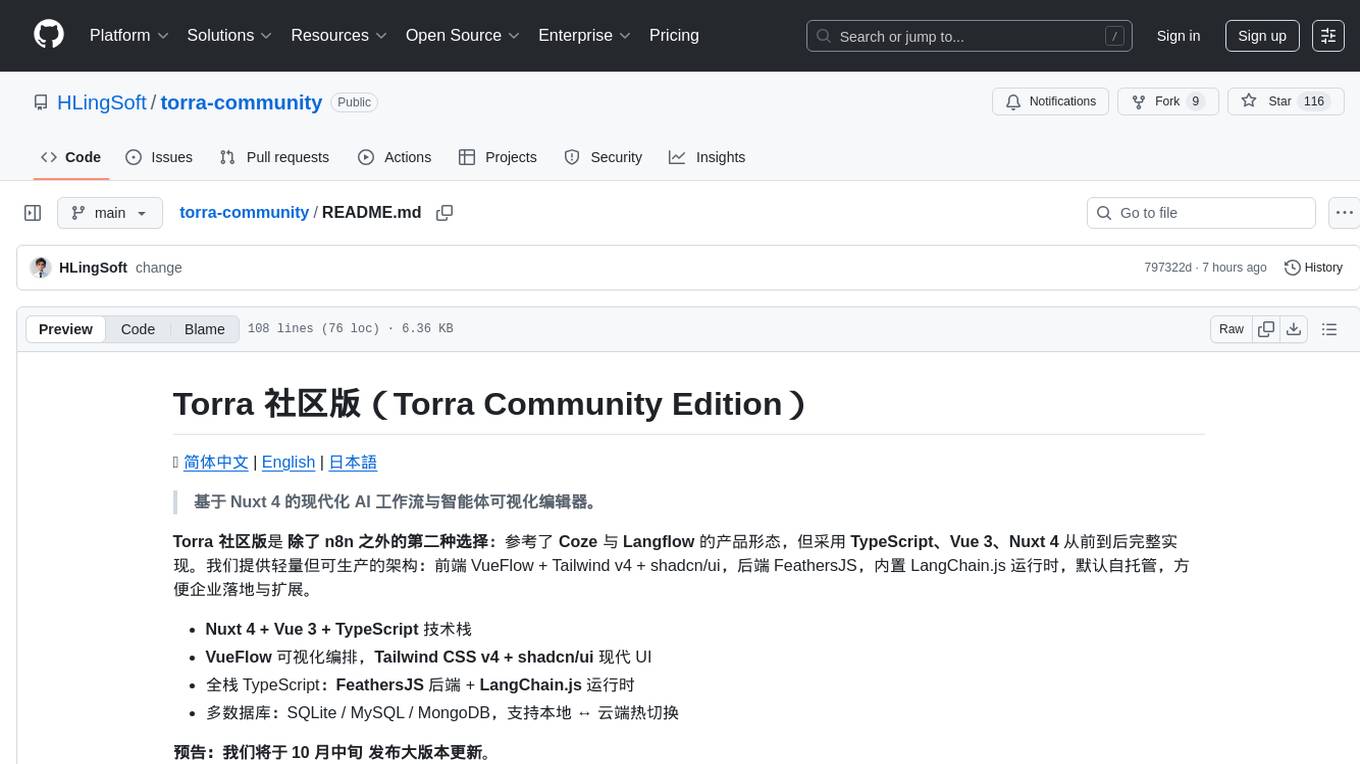
torra-community
Torra Community Edition is a modern AI workflow and intelligent agent visualization editor based on Nuxt 4. It offers a lightweight but production-ready architecture with frontend VueFlow + Tailwind v4 + shadcn/ui, backend FeathersJS, and built-in LangChain.js runtime. It supports multiple databases (SQLite/MySQL/MongoDB) and local ↔ cloud hot switching. The tool covers various tasks such as visual workflow editing, modern UI, native integration of LangChain.js, pluggable storage options, full-stack TypeScript implementation, and more. It is designed for enterprises looking for an easy-to-deploy and scalable solution for AI workflows.
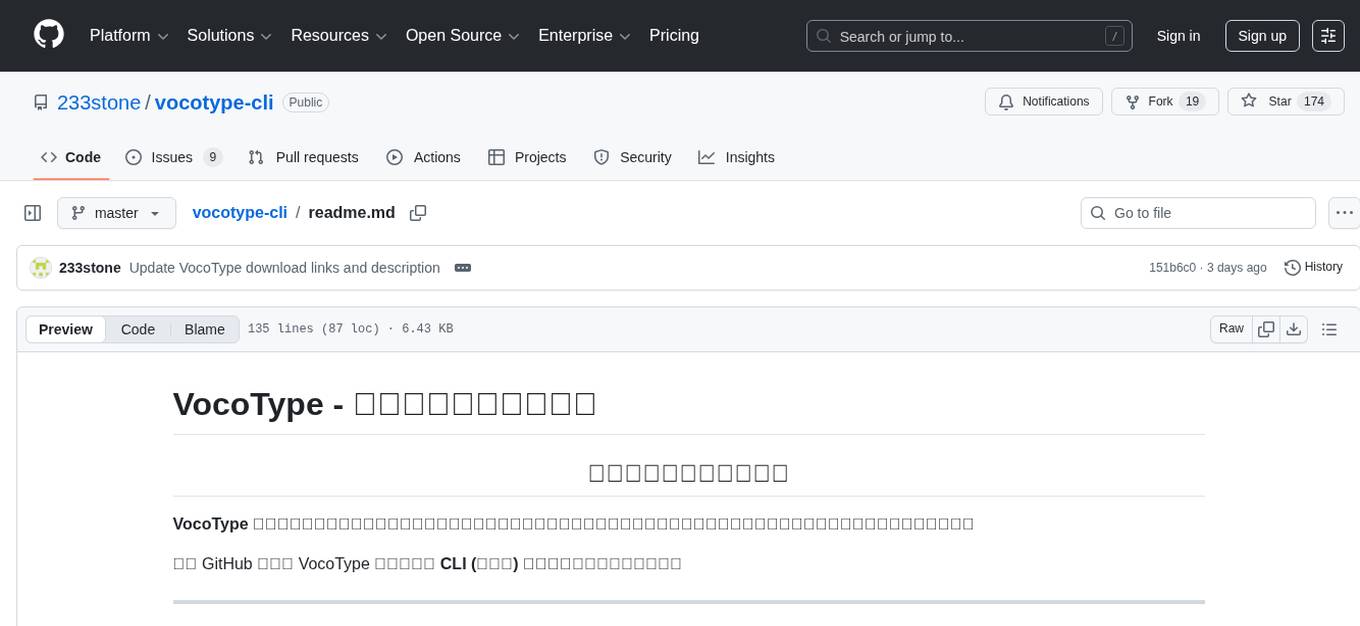
vocotype-cli
VocoType is a free desktop voice input method designed for professionals who value privacy and efficiency. All recognition is done locally, ensuring offline operation and no data upload. The CLI open-source version of the VocoType core engine on GitHub is mainly targeted at developers.

ChatGPT-Next-Web-Pro
ChatGPT-Next-Web-Pro is a tool that provides an enhanced version of ChatGPT-Next-Web with additional features and functionalities. It offers complete ChatGPT-Next-Web functionality, file uploading and storage capabilities, drawing and video support, multi-modal support, reverse model support, knowledge base integration, translation, customizations, and more. The tool can be deployed with or without a backend, allowing users to interact with AI models, manage accounts, create models, manage API keys, handle orders, manage memberships, and more. It supports various cloud services like Aliyun OSS, Tencent COS, and Minio for file storage, and integrates with external APIs like Azure, Google Gemini Pro, and Luma. The tool also provides options for customizing website titles, subtitles, icons, and plugin buttons, and offers features like voice input, file uploading, real-time token count display, and more.
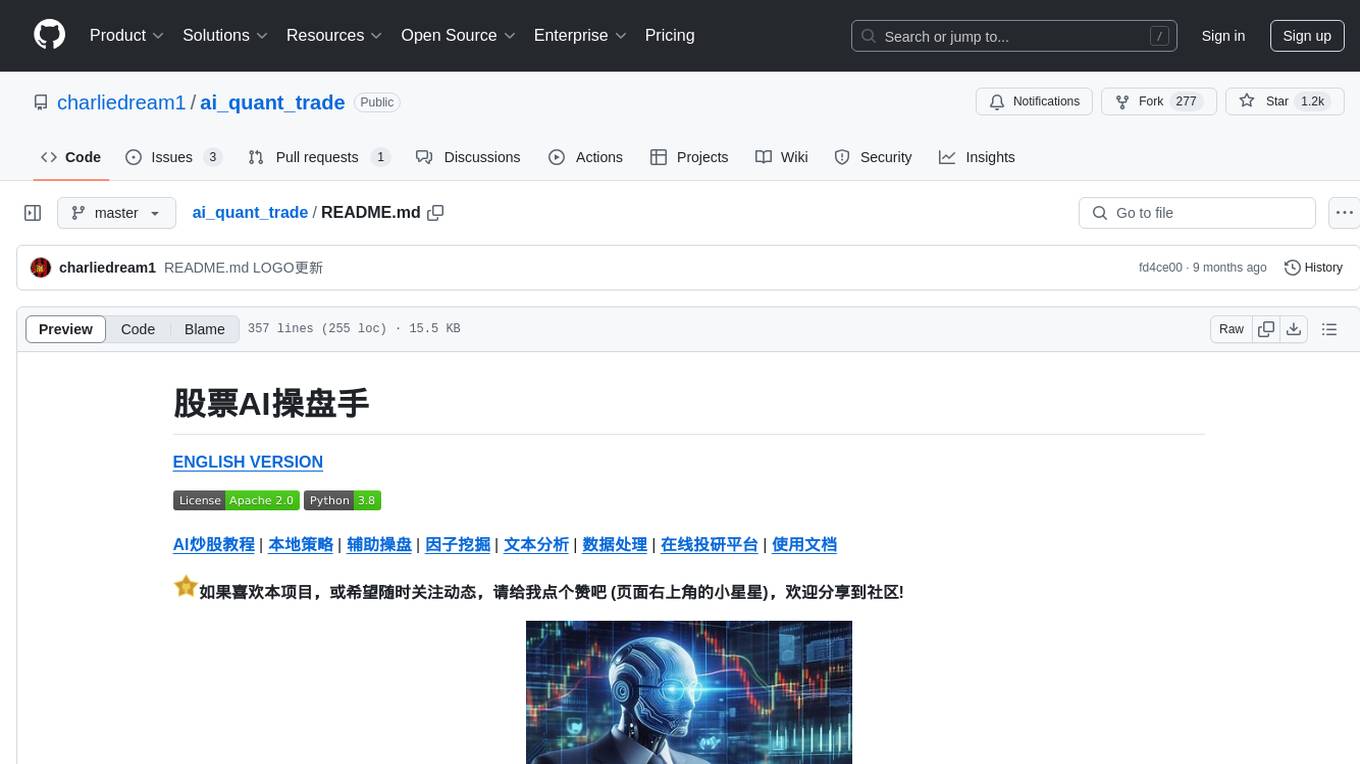
ai_quant_trade
The ai_quant_trade repository is a comprehensive platform for stock AI trading, offering learning, simulation, and live trading capabilities. It includes features such as factor mining, traditional strategies, machine learning, deep learning, reinforcement learning, graph networks, and high-frequency trading. The repository provides tools for monitoring stocks, stock recommendations, and deployment tools for live trading. It also features new functionalities like sentiment analysis using StructBERT, reinforcement learning for multi-stock trading with a 53% annual return, automatic factor mining with 5000 factors, customized stock monitoring software, and local deep reinforcement learning strategies.
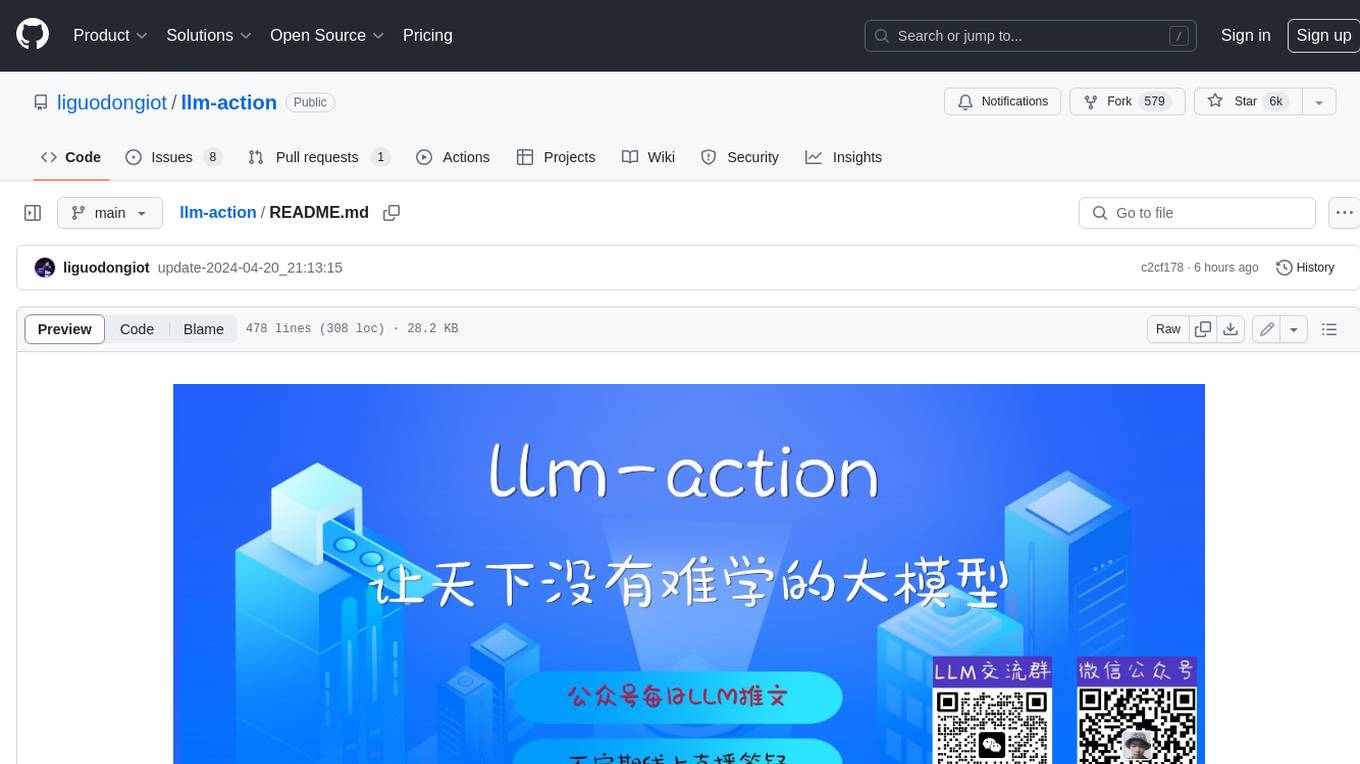
llm-action
This repository provides a comprehensive guide to large language models (LLMs), covering various aspects such as training, fine-tuning, compression, and applications. It includes detailed tutorials, code examples, and explanations of key concepts and techniques. The repository is maintained by Liguo Dong, an AI researcher and engineer with expertise in LLM research and development.
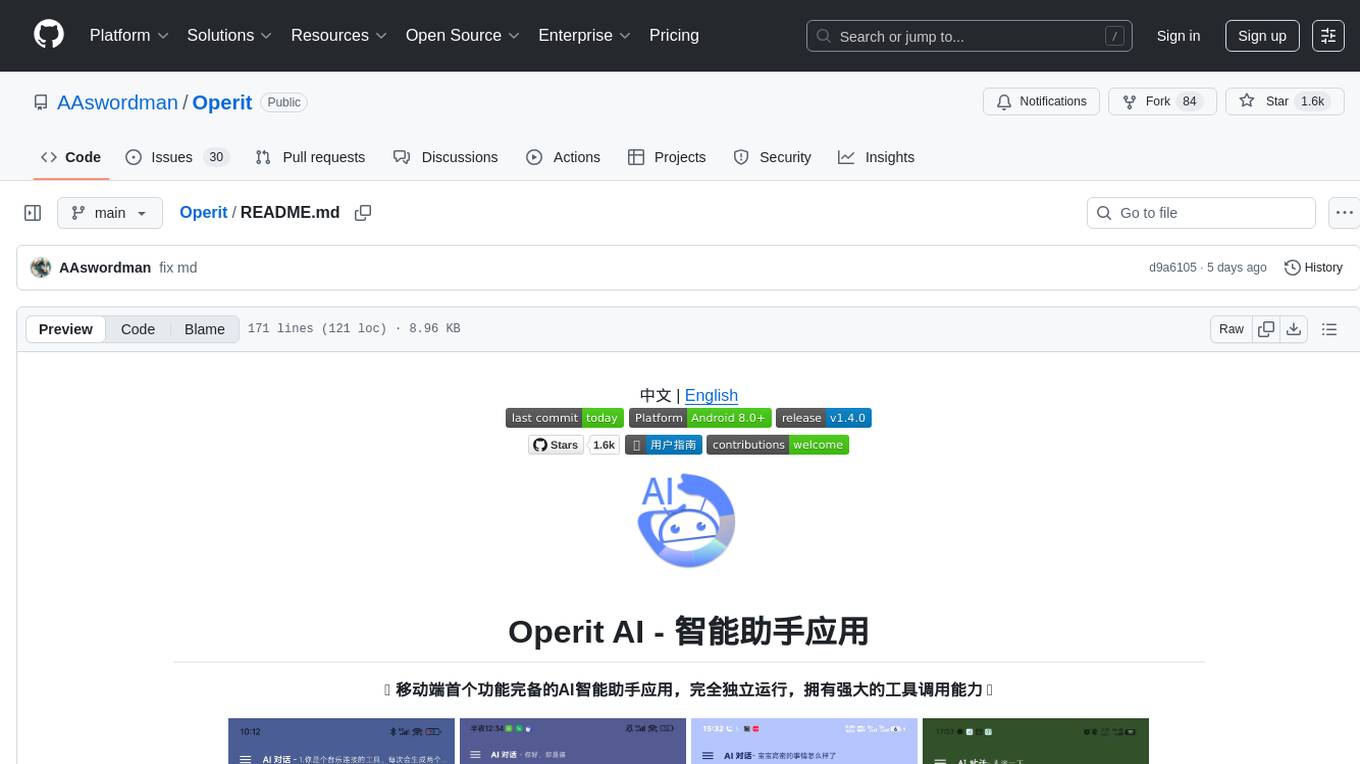
Operit
Operit AI is a fully functional AI assistant application for mobile devices, running independently on Android devices with powerful tool invocation capabilities. It offers over 40 built-in tools for file system operations, HTTP requests, system operations, UI automation, and media processing. The app combines these tools with rich plugins to enable a wide range of tasks, from simple to complex, providing a comprehensive experience of a smartphone AI assistant.
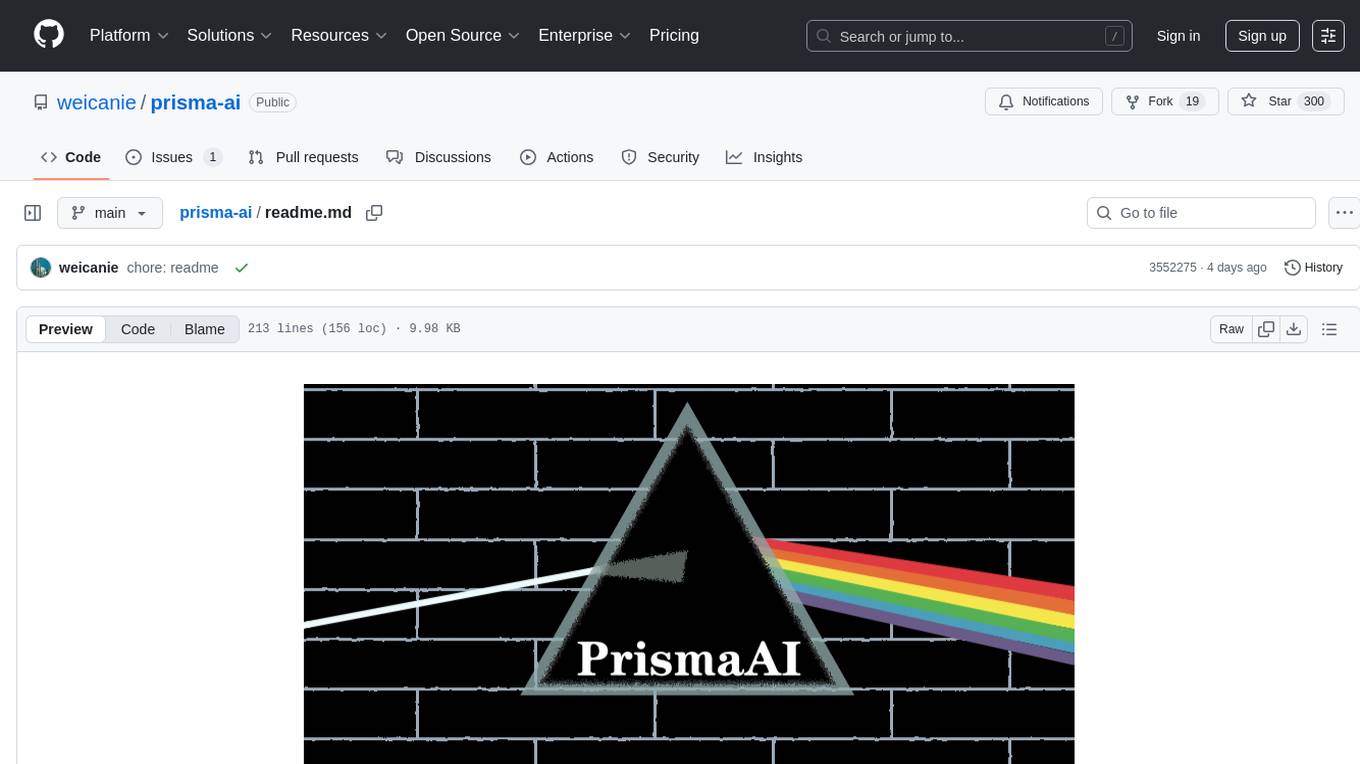
prisma-ai
Prisma-AI is an open-source tool designed to assist users in their job search process by addressing common challenges such as lack of project highlights, mismatched resumes, difficulty in learning, and lack of answers in interview experiences. The tool utilizes AI to analyze user experiences, generate actionable project highlights, customize resumes for specific job positions, provide study materials for efficient learning, and offer structured interview answers. It also features a user-friendly interface for easy deployment and supports continuous improvement through user feedback and collaboration.
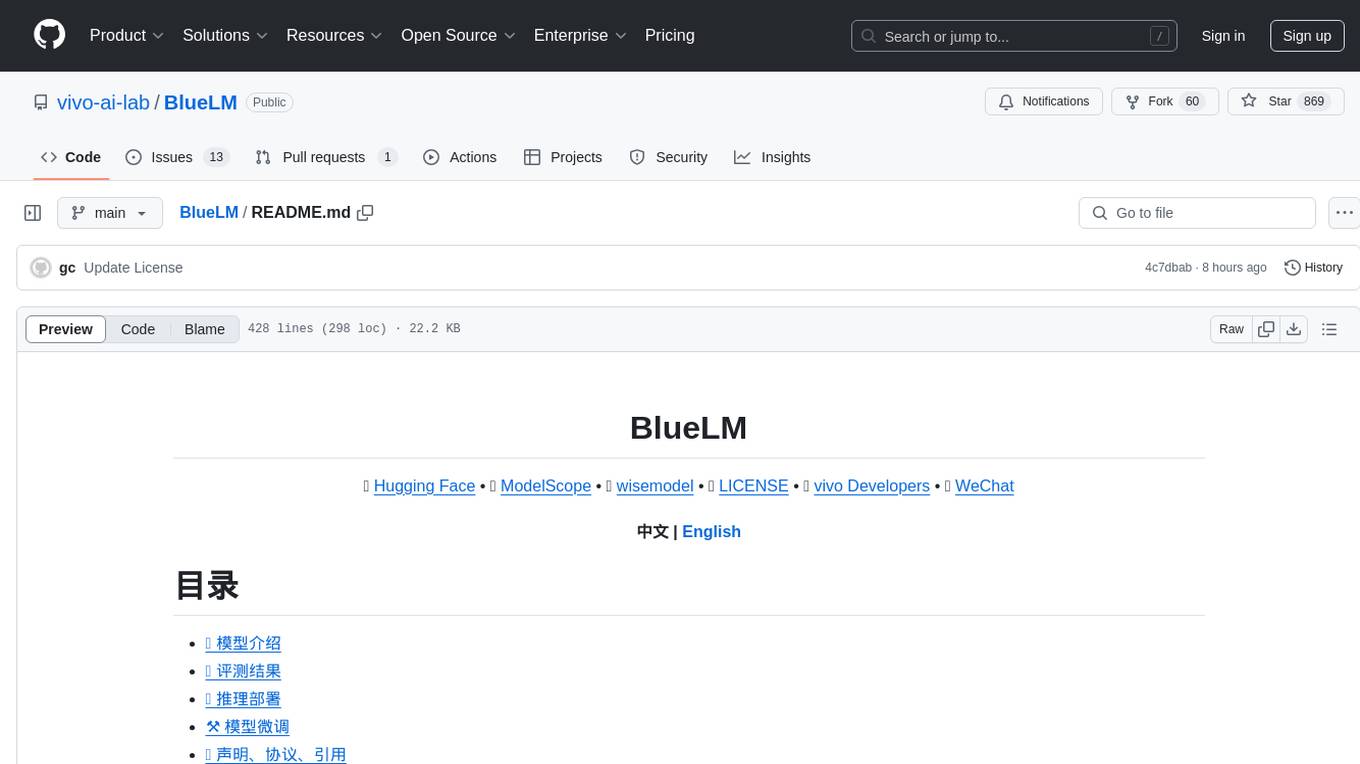
BlueLM
BlueLM is a large-scale pre-trained language model developed by vivo AI Global Research Institute, featuring 7B base and chat models. It includes high-quality training data with a token scale of 26 trillion, supporting both Chinese and English languages. BlueLM-7B-Chat excels in C-Eval and CMMLU evaluations, providing strong competition among open-source models of similar size. The models support 32K long texts for better context understanding while maintaining base capabilities. BlueLM welcomes developers for academic research and commercial applications.
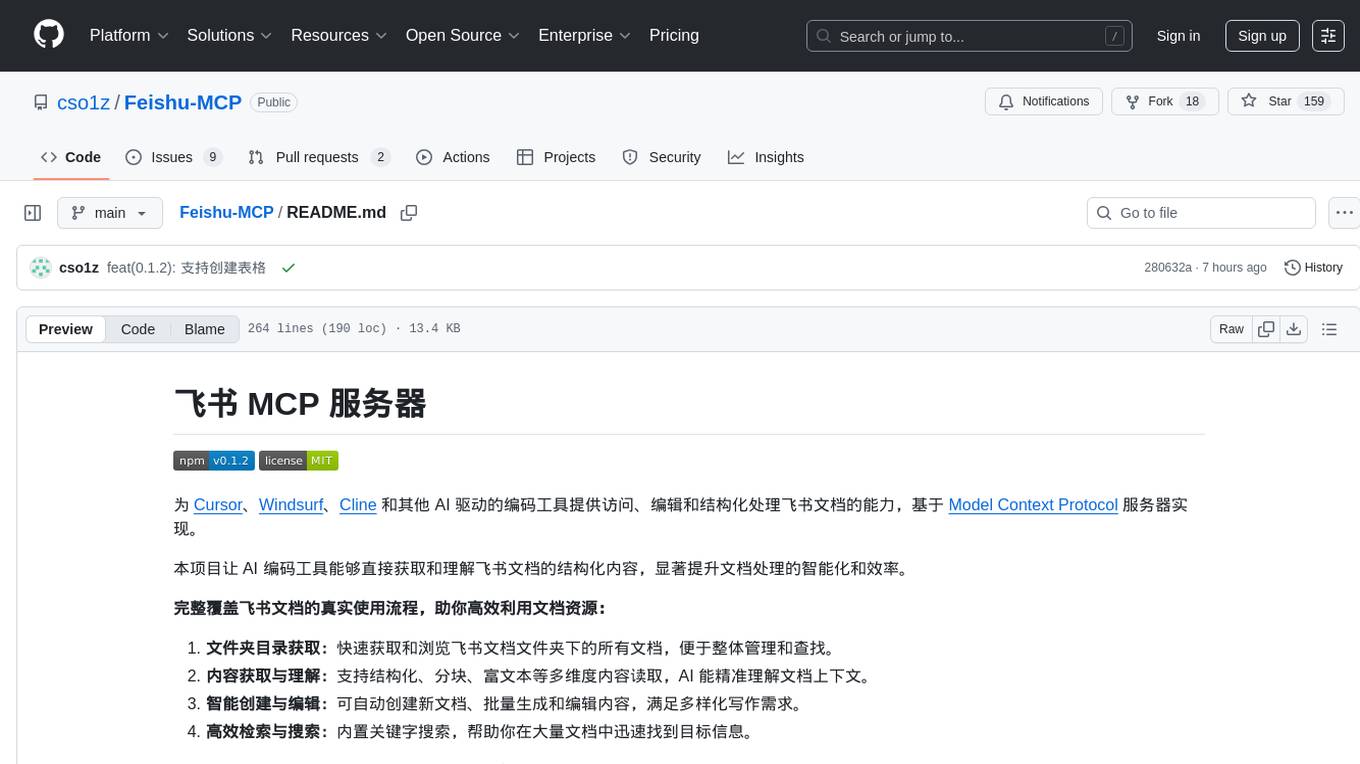
Feishu-MCP
Feishu-MCP is a server that provides access, editing, and structured processing capabilities for Feishu documents for Cursor, Windsurf, Cline, and other AI-driven coding tools, based on the Model Context Protocol server. This project enables AI coding tools to directly access and understand the structured content of Feishu documents, significantly improving the intelligence and efficiency of document processing. It covers the real usage process of Feishu documents, allowing efficient utilization of document resources, including folder directory retrieval, content retrieval and understanding, smart creation and editing, efficient search and retrieval, and more. It enhances the intelligent access, editing, and searching of Feishu documents in daily usage, improving content processing efficiency and experience.
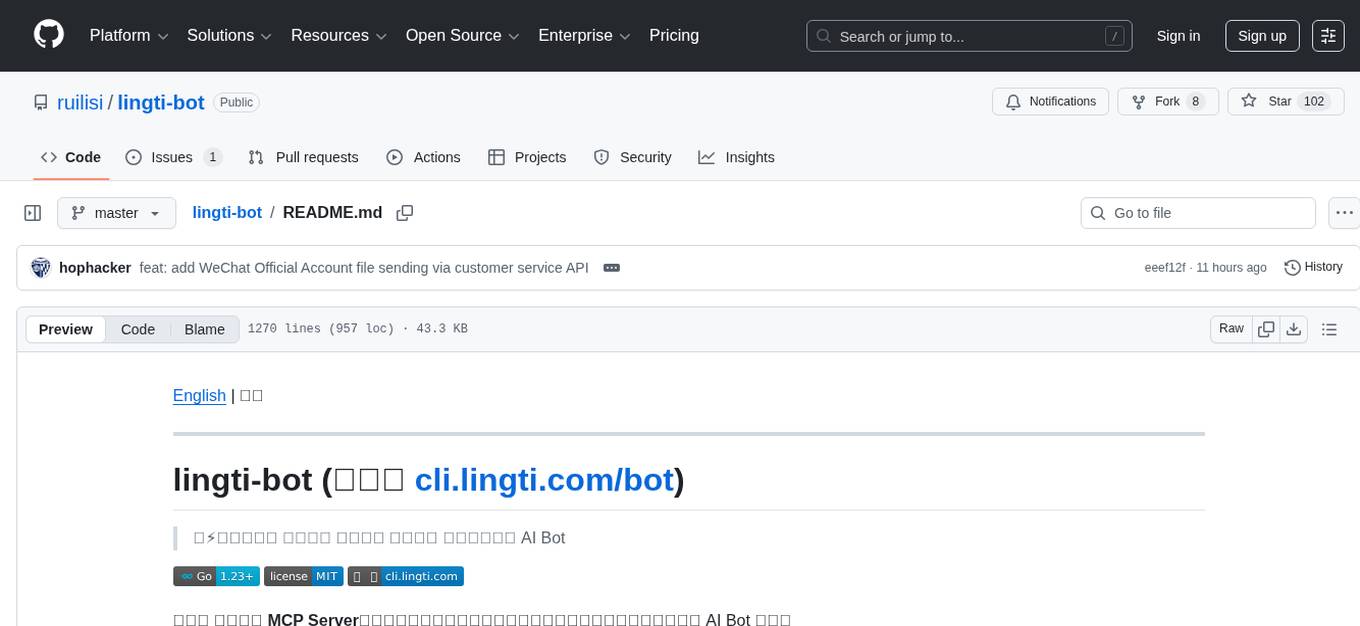
lingti-bot
lingti-bot is an AI Bot platform that integrates MCP Server, multi-platform message gateway, rich toolset, intelligent conversation, and voice interaction. It offers core advantages like zero-dependency deployment with a single 30MB binary file, cloud relay support for quick integration with enterprise WeChat/WeChat Official Account, built-in browser automation with CDP protocol control, 75+ MCP tools covering various scenarios, native support for Chinese platforms like DingTalk, Feishu, enterprise WeChat, WeChat Official Account, and more. It is embeddable, supports multiple AI backends like Claude, DeepSeek, Kimi, MiniMax, and Gemini, and allows access from platforms like DingTalk, Feishu, enterprise WeChat, WeChat Official Account, Slack, Telegram, and Discord. The bot is designed with simplicity as the highest design principle, focusing on zero-dependency deployment, embeddability, plain text output, code restraint, and cloud relay support.
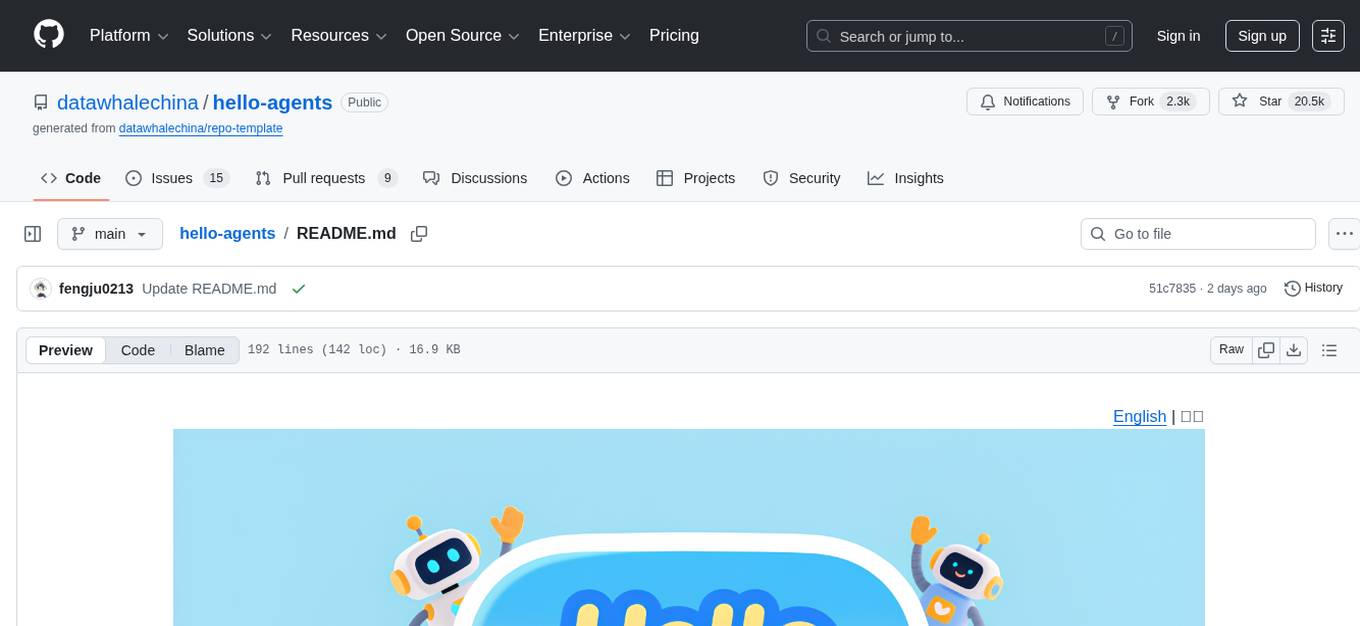
hello-agents
Hello-Agents is a comprehensive tutorial on building intelligent agent systems, covering both theoretical foundations and practical applications. The tutorial aims to guide users in understanding and building AI-native agents, diving deep into core principles, architectures, and paradigms of intelligent agents. Users will learn to develop their own multi-agent applications from scratch, gaining hands-on experience with popular low-code platforms and agent frameworks. The tutorial also covers advanced topics such as memory systems, context engineering, communication protocols, and model training. By the end of the tutorial, users will have the skills to develop real-world projects like intelligent travel assistants and cyber towns.
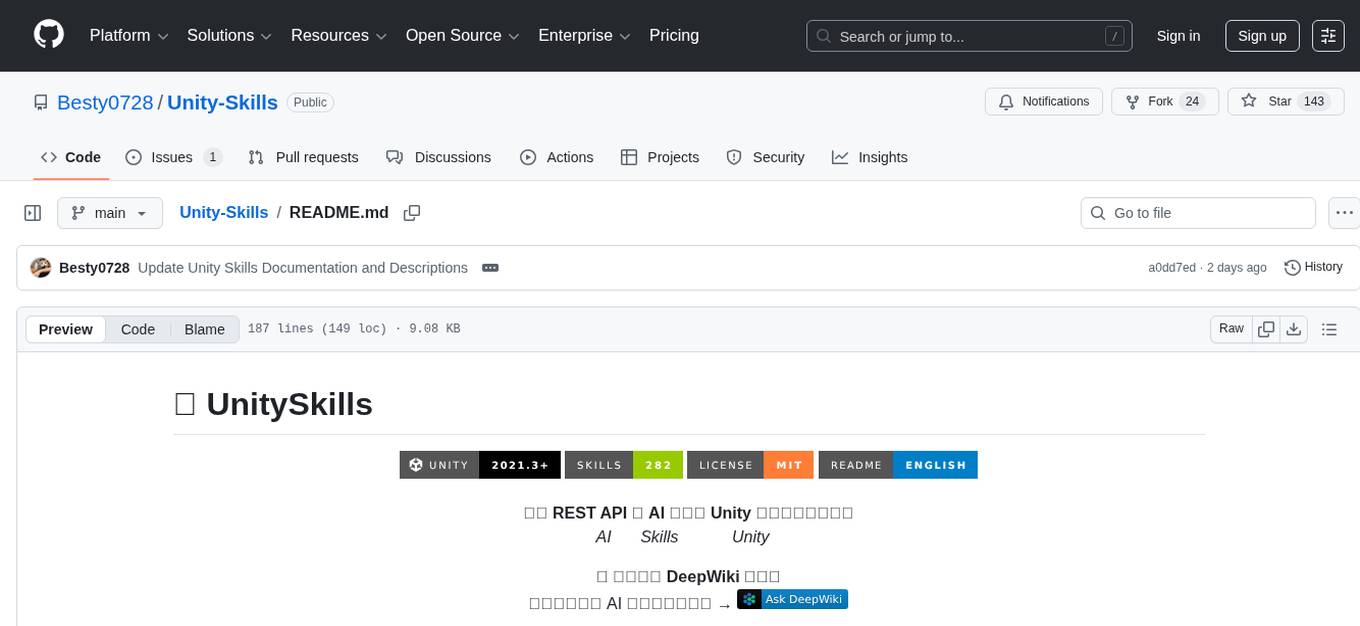
Unity-Skills
UnitySkills is an AI-driven Unity editor automation engine based on REST API. It allows AI to directly control Unity scenes through Skills. The tool offers extreme efficiency with Result Truncation and SKILL.md slimming, a versatile tool library with 282 Skills supporting Batch operations, ensuring transactional safety with automatic rollback, multiple instance support for controlling multiple Unity projects simultaneously, deep integration with Antigravity Slash Commands for interactive experience, compatibility with popular AI terminals like Claude Code, Antigravity, Gemini CLI, and support for Cinemachine 2.x/3.x dual versions with advanced camera control features like MixingCamera, ClearShot, TargetGroup, and Spline.
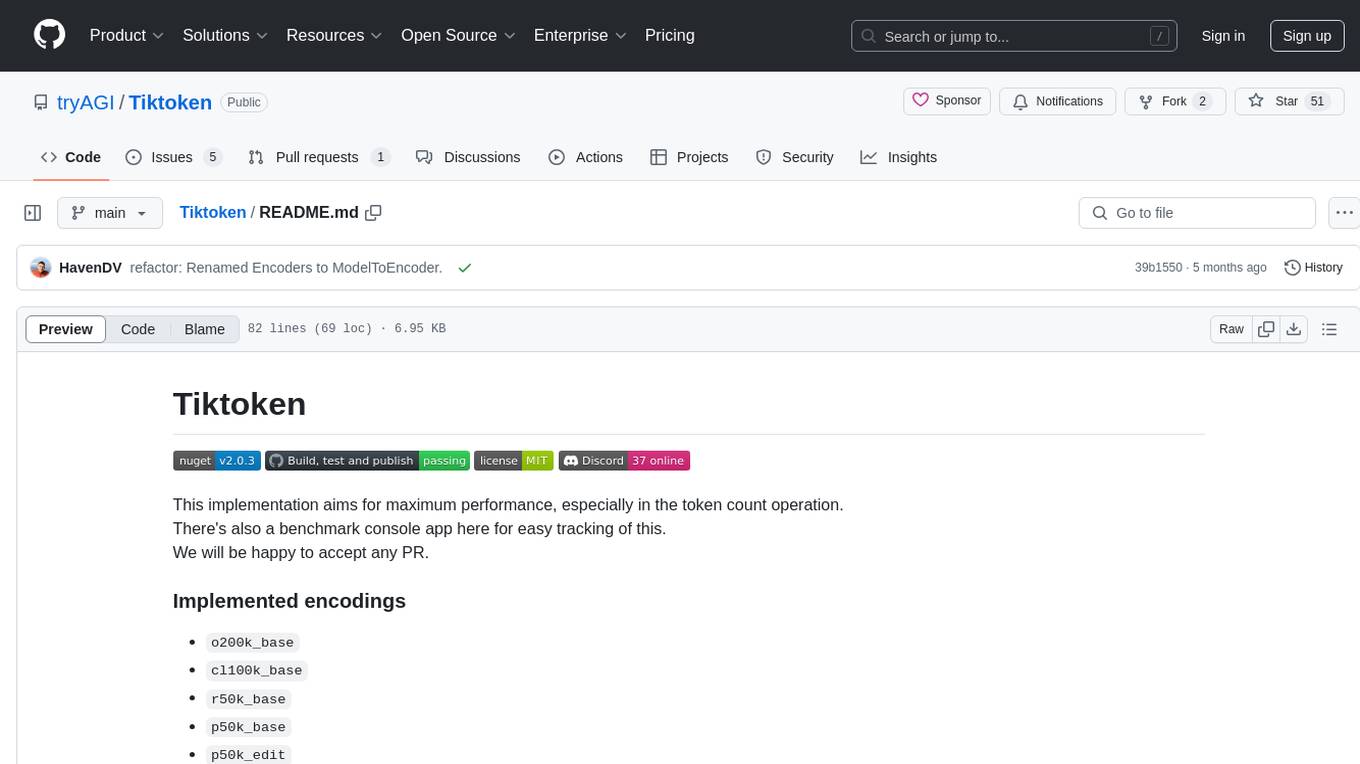
Tiktoken
Tiktoken is a high-performance implementation focused on token count operations. It provides various encodings like o200k_base, cl100k_base, r50k_base, p50k_base, and p50k_edit. Users can easily encode and decode text using the provided API. The repository also includes a benchmark console app for performance tracking. Contributions in the form of PRs are welcome.
For similar tasks

DeepLearing-Interview-Awesome-2024
DeepLearning-Interview-Awesome-2024 is a repository that covers various topics related to deep learning, computer vision, big models (LLMs), autonomous driving, smart healthcare, and more. It provides a collection of interview questions with detailed explanations sourced from recent academic papers and industry developments. The repository is aimed at assisting individuals in academic research, work innovation, and job interviews. It includes six major modules covering topics such as large language models (LLMs), computer vision models, common problems in computer vision and perception algorithms, deep learning basics and frameworks, as well as specific tasks like 3D object detection, medical image segmentation, and more.
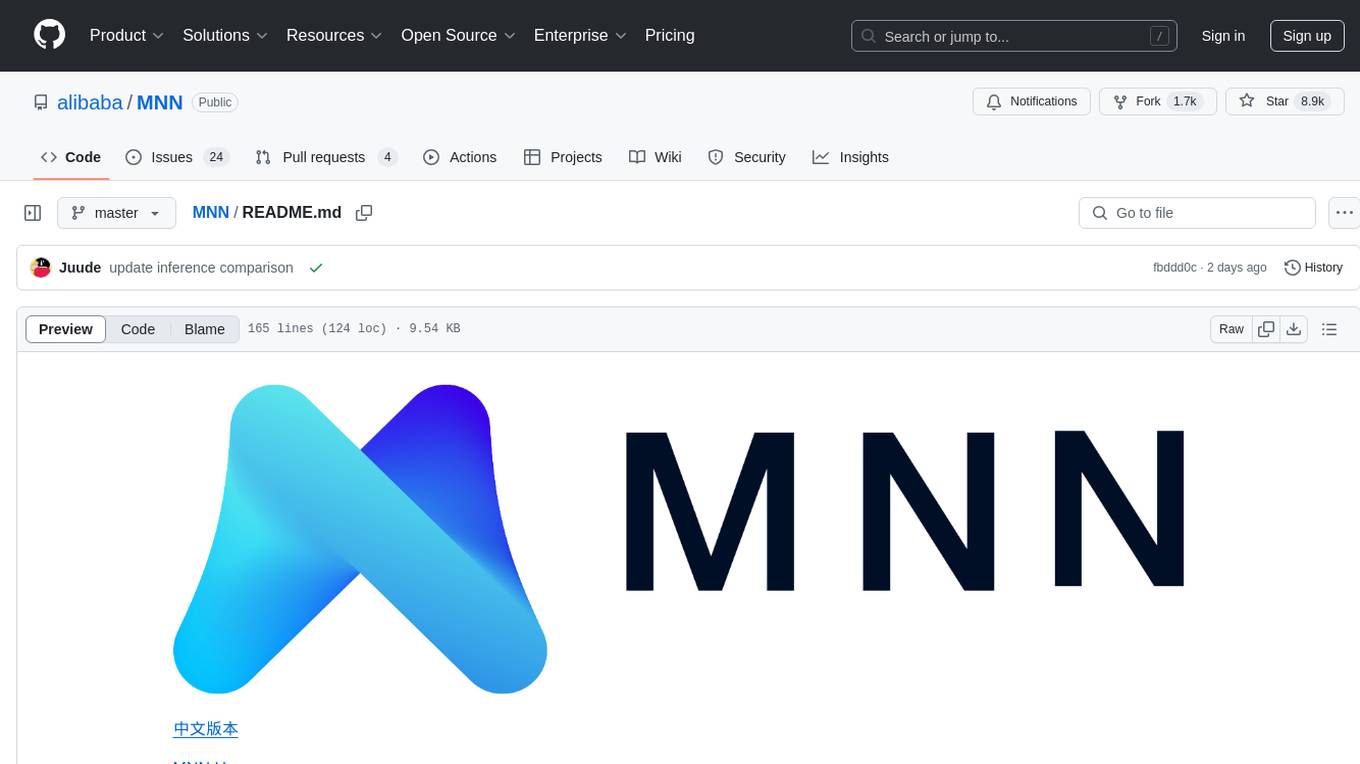
MNN
MNN is a highly efficient and lightweight deep learning framework that supports inference and training of deep learning models. It has industry-leading performance for on-device inference and training. MNN has been integrated into various Alibaba Inc. apps and is used in scenarios like live broadcast, short video capture, search recommendation, and product searching by image. It is also utilized on embedded devices such as IoT. MNN-LLM and MNN-Diffusion are specific runtime solutions developed based on the MNN engine for deploying language models and diffusion models locally on different platforms. The framework is optimized for devices, supports various neural networks, and offers high performance with optimized assembly code and GPU support. MNN is versatile, easy to use, and supports hybrid computing on multiple devices.
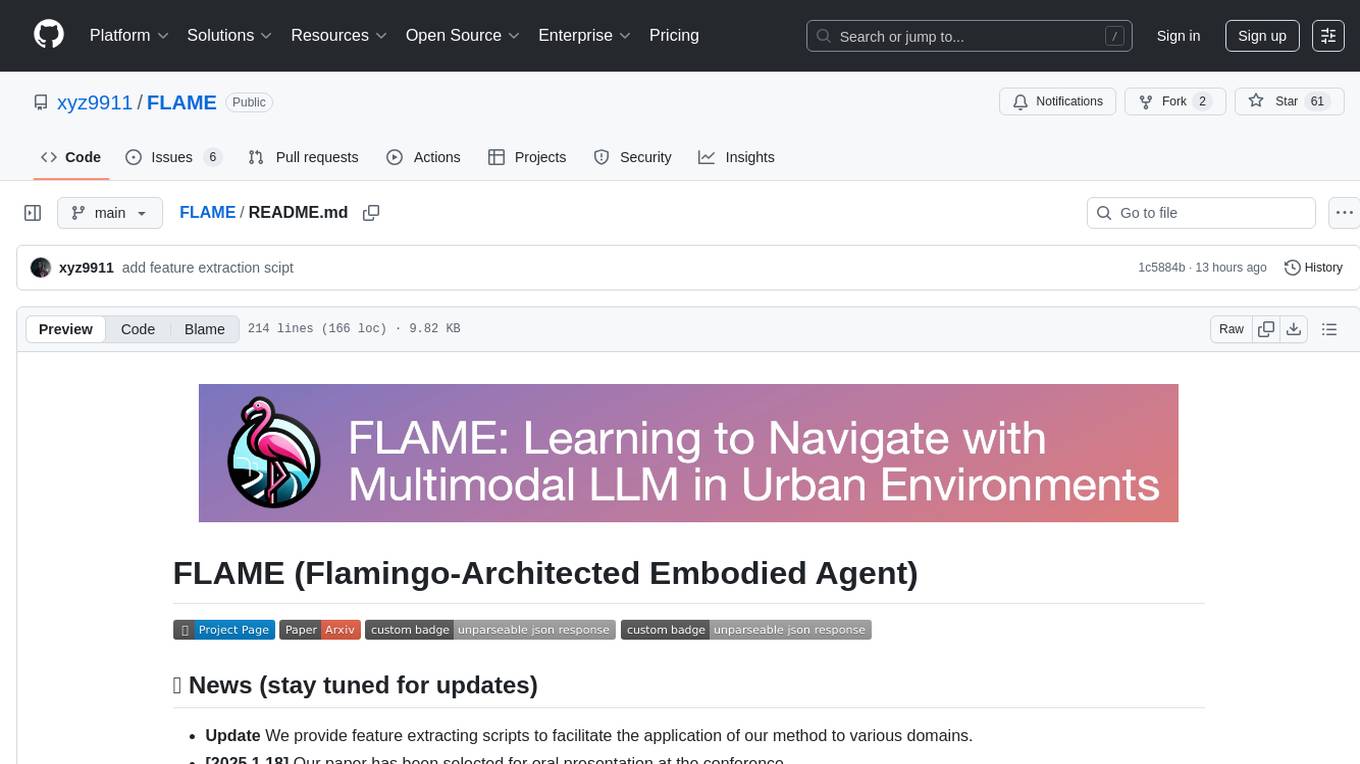
FLAME
FLAME is a lightweight and efficient deep learning framework designed for edge devices. It provides a simple and user-friendly interface for developing and deploying deep learning models on resource-constrained devices. With FLAME, users can easily build and optimize neural networks for tasks such as image classification, object detection, and natural language processing. The framework supports various neural network architectures and optimization techniques, making it suitable for a wide range of applications in the field of edge computing.
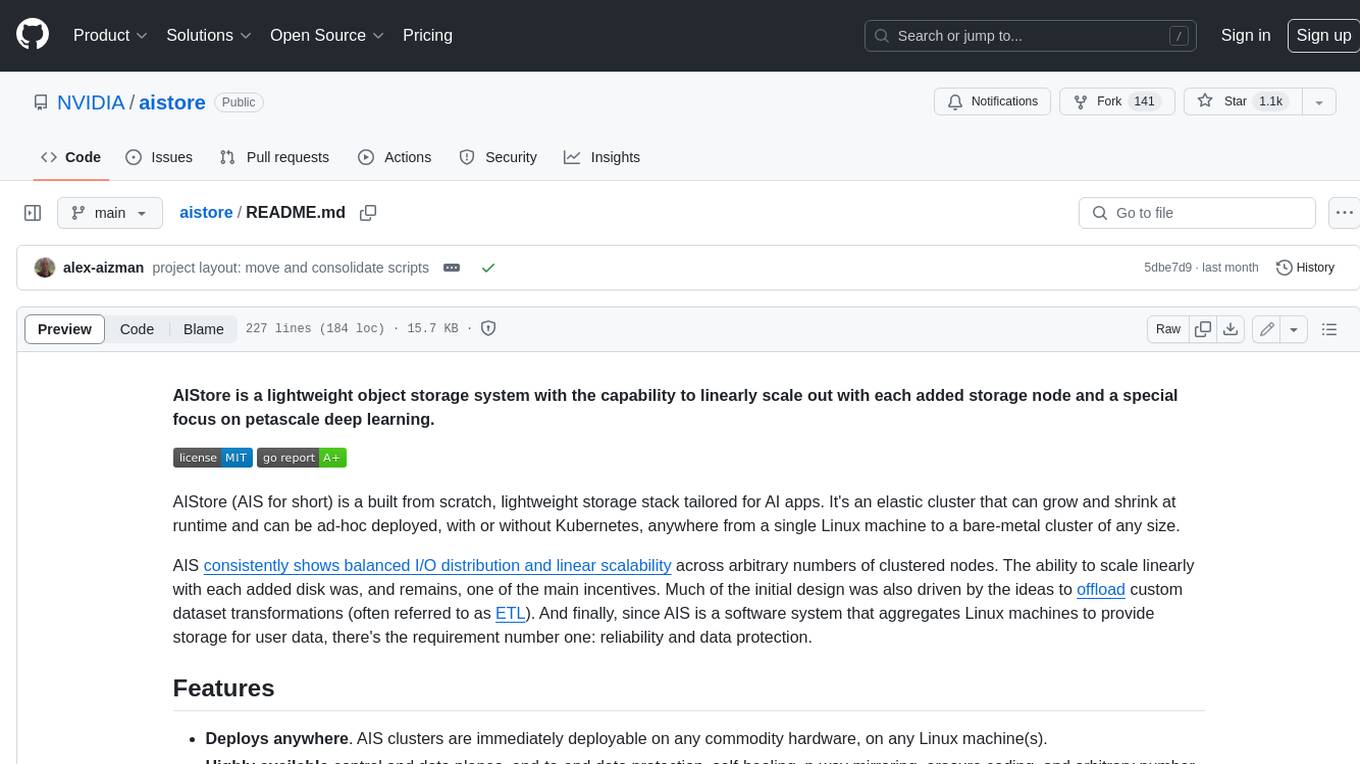
aistore
AIStore is a lightweight object storage system designed for AI applications. It is highly scalable, reliable, and easy to use. AIStore can be deployed on any commodity hardware, and it can be used to store and manage large datasets for deep learning and other AI applications.
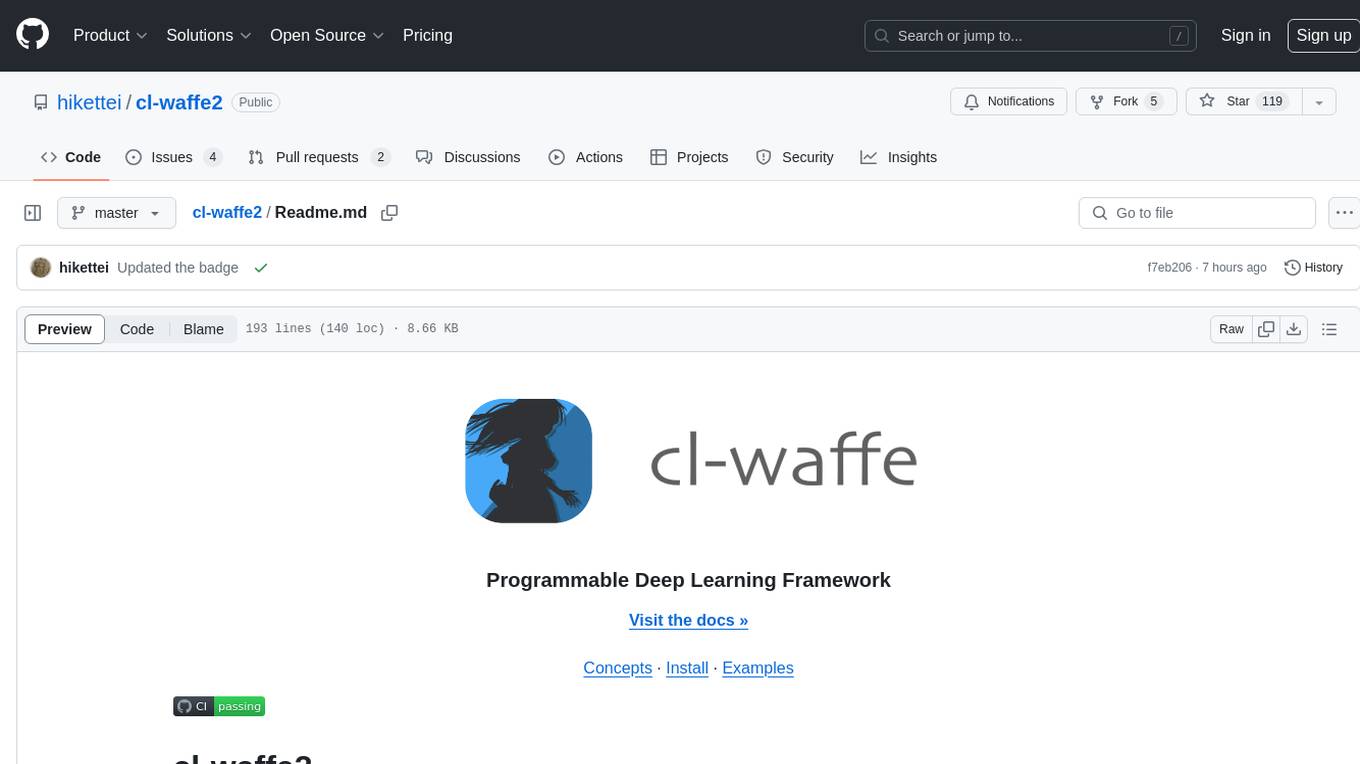
cl-waffe2
cl-waffe2 is an experimental deep learning framework in Common Lisp, providing fast, systematic, and customizable matrix operations, reverse mode tape-based Automatic Differentiation, and neural network model building and training features accelerated by a JIT Compiler. It offers abstraction layers, extensibility, inlining, graph-level optimization, visualization, debugging, systematic nodes, and symbolic differentiation. Users can easily write extensions and optimize their networks without overheads. The framework is designed to eliminate barriers between users and developers, allowing for easy customization and extension.
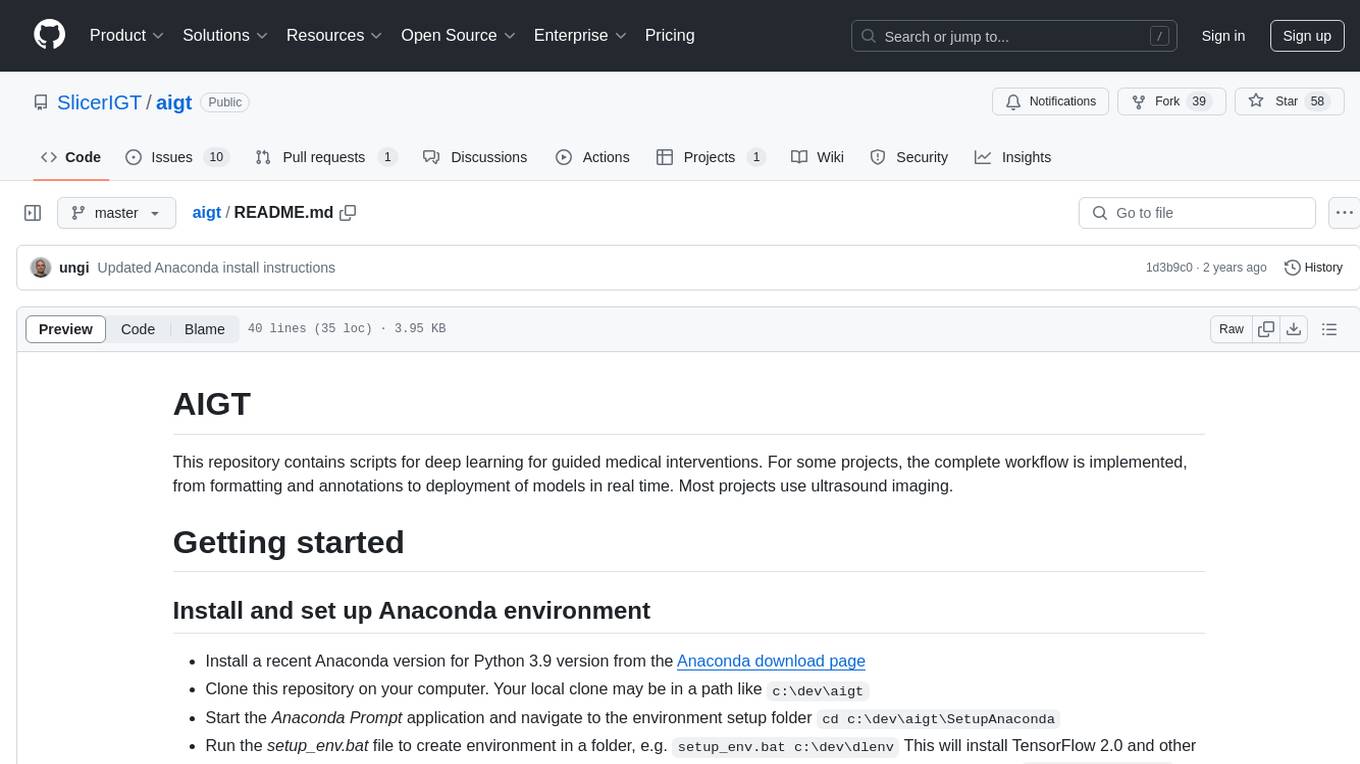
aigt
AIGT is a repository containing scripts for deep learning in guided medical interventions, focusing on ultrasound imaging. It provides a complete workflow from formatting and annotations to real-time model deployment. Users can set up an Anaconda environment, run Slicer notebooks, acquire tracked ultrasound data, and process exported data for training. The repository includes tools for segmentation, image export, and annotation creation.
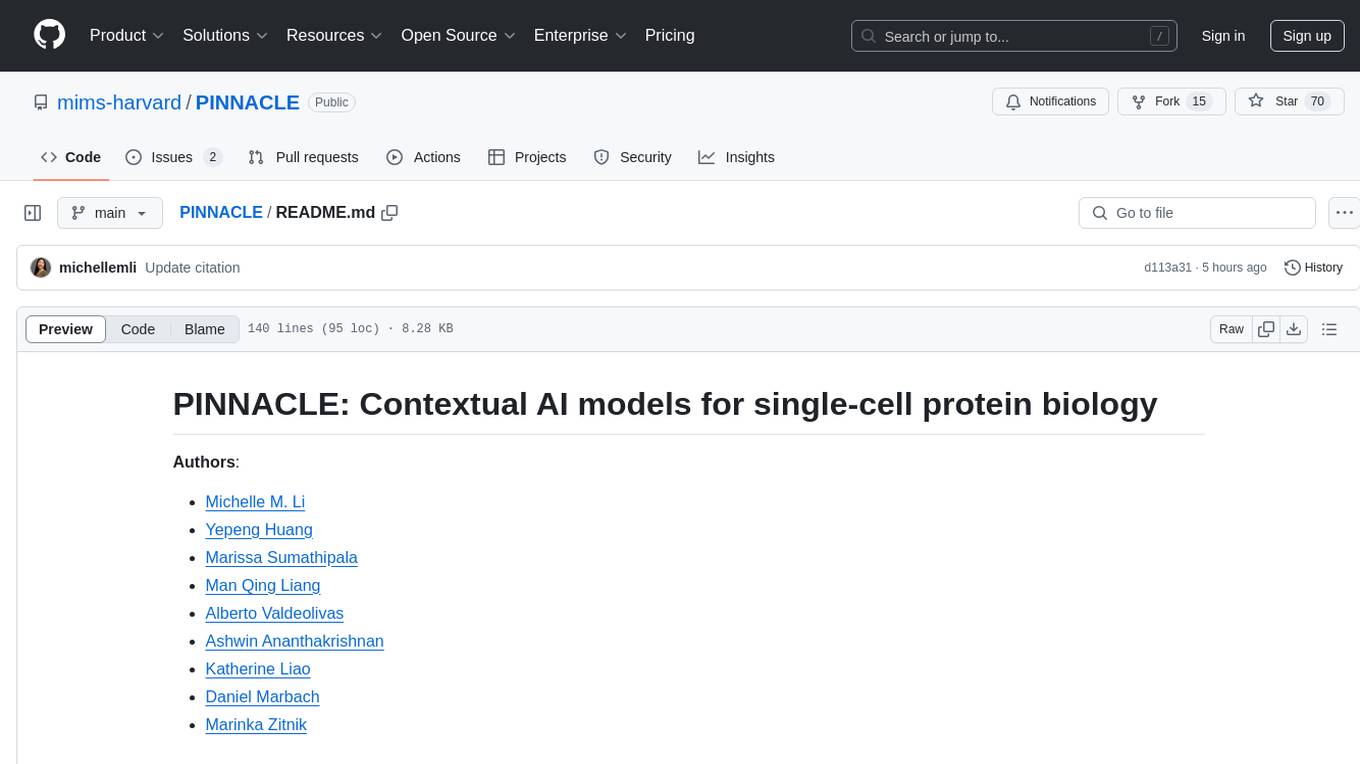
PINNACLE
PINNACLE is a flexible geometric deep learning approach that trains on contextualized protein interaction networks to generate context-aware protein representations. It provides protein representations split across various cell-type contexts from different tissues and organs. The tool can be fine-tuned to study the genomic effects of drugs and nominate promising protein targets and cell-type contexts for further investigation. PINNACLE exemplifies the paradigm of incorporating context-specific effects for studying biological systems, especially the impact of disease and therapeutics.
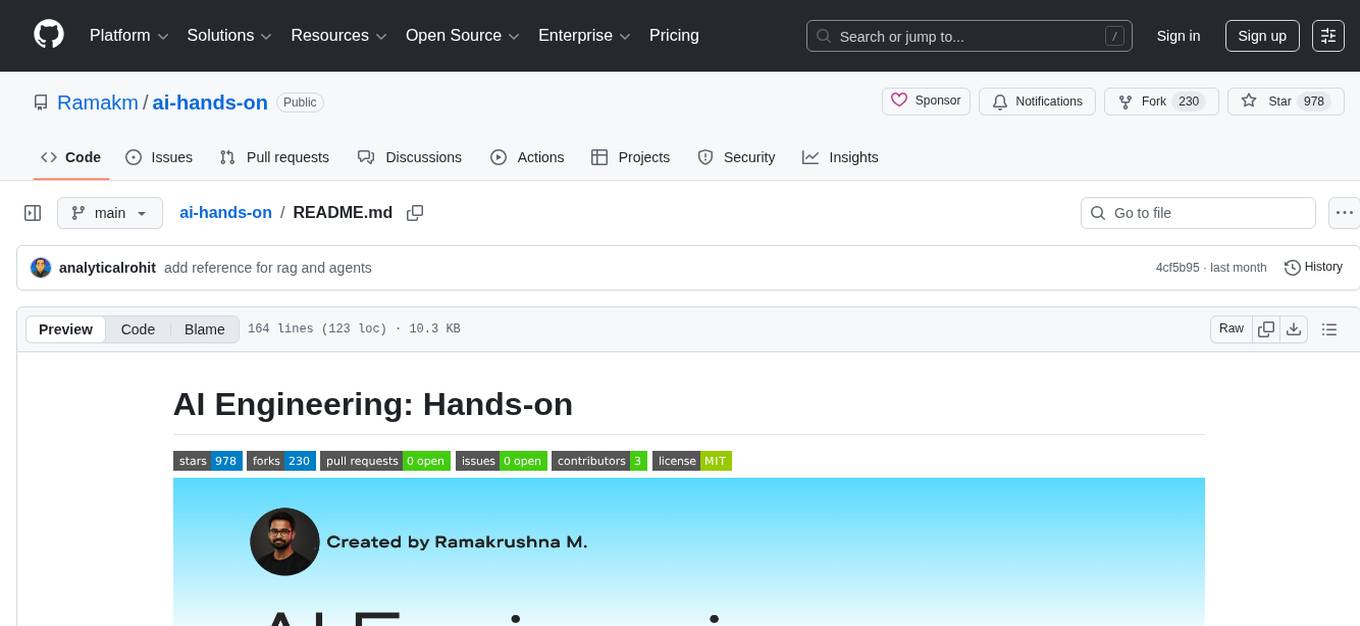
ai-hands-on
A complete, hands-on guide to becoming an AI Engineer. This repository is designed to help you learn AI from first principles, build real neural networks, and understand modern LLM systems end-to-end. Progress through math, PyTorch, deep learning, transformers, RAG, and OCR with clean, intuitive Jupyter notebooks guiding you at every step. Suitable for beginners and engineers leveling up, providing clarity, structure, and intuition to build real AI systems.
For similar jobs

weave
Weave is a toolkit for developing Generative AI applications, built by Weights & Biases. With Weave, you can log and debug language model inputs, outputs, and traces; build rigorous, apples-to-apples evaluations for language model use cases; and organize all the information generated across the LLM workflow, from experimentation to evaluations to production. Weave aims to bring rigor, best-practices, and composability to the inherently experimental process of developing Generative AI software, without introducing cognitive overhead.

LLMStack
LLMStack is a no-code platform for building generative AI agents, workflows, and chatbots. It allows users to connect their own data, internal tools, and GPT-powered models without any coding experience. LLMStack can be deployed to the cloud or on-premise and can be accessed via HTTP API or triggered from Slack or Discord.

VisionCraft
The VisionCraft API is a free API for using over 100 different AI models. From images to sound.

kaito
Kaito is an operator that automates the AI/ML inference model deployment in a Kubernetes cluster. It manages large model files using container images, avoids tuning deployment parameters to fit GPU hardware by providing preset configurations, auto-provisions GPU nodes based on model requirements, and hosts large model images in the public Microsoft Container Registry (MCR) if the license allows. Using Kaito, the workflow of onboarding large AI inference models in Kubernetes is largely simplified.

PyRIT
PyRIT is an open access automation framework designed to empower security professionals and ML engineers to red team foundation models and their applications. It automates AI Red Teaming tasks to allow operators to focus on more complicated and time-consuming tasks and can also identify security harms such as misuse (e.g., malware generation, jailbreaking), and privacy harms (e.g., identity theft). The goal is to allow researchers to have a baseline of how well their model and entire inference pipeline is doing against different harm categories and to be able to compare that baseline to future iterations of their model. This allows them to have empirical data on how well their model is doing today, and detect any degradation of performance based on future improvements.

tabby
Tabby is a self-hosted AI coding assistant, offering an open-source and on-premises alternative to GitHub Copilot. It boasts several key features: * Self-contained, with no need for a DBMS or cloud service. * OpenAPI interface, easy to integrate with existing infrastructure (e.g Cloud IDE). * Supports consumer-grade GPUs.

spear
SPEAR (Simulator for Photorealistic Embodied AI Research) is a powerful tool for training embodied agents. It features 300 unique virtual indoor environments with 2,566 unique rooms and 17,234 unique objects that can be manipulated individually. Each environment is designed by a professional artist and features detailed geometry, photorealistic materials, and a unique floor plan and object layout. SPEAR is implemented as Unreal Engine assets and provides an OpenAI Gym interface for interacting with the environments via Python.

Magick
Magick is a groundbreaking visual AIDE (Artificial Intelligence Development Environment) for no-code data pipelines and multimodal agents. Magick can connect to other services and comes with nodes and templates well-suited for intelligent agents, chatbots, complex reasoning systems and realistic characters.




